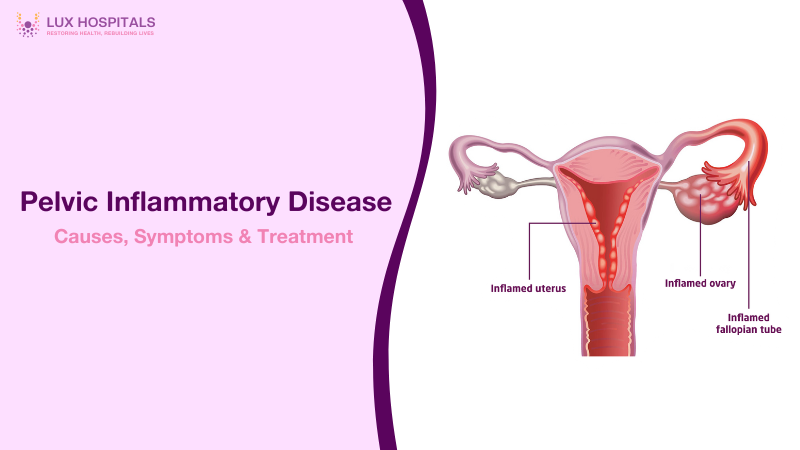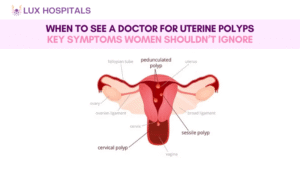Pelvic Inflammatory Disease: Causes, Symptoms and Treatment

When it comes to reproductive health, few conditions are as commonly misunderstood—and underestimated as Pelvic Inflammatory Disease (PID). Often silent in the early stages, PID can quietly progress and cause serious complications if left untreated. The good news? With early diagnosis and the right care, it’s manageable and often completely treatable.
At Lux Hospitals, we believe in educating and empowering our patients, especially when it comes to something as crucial as PID. Let’s know the causes, symptoms, and treatment options for Pelvic Inflammatory Disease, along with how to protect yourself and your fertility.
What is Pelvic Inflammatory Disease?
A female reproductive organ infection is known as pelvic inflammatory disease. typically affecting the uterus, fallopian tubes, and ovaries. It often results from sexually transmitted infections (STIs) like chlamydia or gonorrhea, but not exclusively. If the infection is not treated, it may spread, which could results to long-term complications such as chronic pain or infertility.
Though commonly diagnosed in women of reproductive age, especially those under 25, it’s important to note that Pelvic Inflammatory Disease in female patients can vary greatly in presentation—from mild discomfort to severe, life-altering symptoms.
Types of Pelvic Inflammatory Disease
PID isn’t a one-size-fits-all diagnosis. There are different types of Pelvic Inflammatory Disease based on the degree and intensity of the infection:
- Acute PID: Symptoms appear suddenly and are often severe.
- Chronic PID: Milder symptoms persist over time, sometimes going unnoticed for months.
- Silent PID: No noticeable symptoms, yet internal damage continues to occur.
Because of these varying types, pelvic inflammatory disease diagnosis often requires a thorough clinical evaluation and testing.
Pelvic Inflammatory Disease Causes
Understanding the pelvic inflammatory disease causes helps in early prevention and timely treatment. The most common cause is an untreated bacterial infection, often following:
- Sexually transmitted infections (STIs): Chlamydia and gonorrhea are the primary culprits.
- Normal vaginal bacteria: In some cases, bacteria can enter the reproductive organs during menstruation, childbirth, miscarriage, or abortion.
- Medical procedures: Intrauterine device (IUD) insertion , endometrial biopsy, or pelvic surgery can sometimes introduce bacteria.
Though rare, Pelvic Inflammatory Disease in men can occur, but it’s generally used to describe epididymitis or urethritis, which may mimic PID-like symptoms in males.
Symptoms of Pelvic Inflammatory Disease
Pelvic Inflammatory Disease symptoms can be elusive, especially in the early stages. However, common signs to watch for include:
- Persistent pelvic pain or lower abdominal discomfort
- Abnormal vaginal discharge with a foul odor
- Pain during intercourse
- Painful or frequent urination
- Irregular menstrual bleeding
- Fever, chills, or fatigue
It’s worth noting that some individuals might not experience any symptoms at all hence the importance of regular gynecological checkups.
Complications of Pelvic Inflammatory Disease
Pelvic Inflammatory Disease, if untreated, can cause several serious health concerns. These complications of Pelvic Inflammatory Disease may include:
- Infertility: Up to 1 in 10 women with PID may struggle to conceive.
- Chronic pelvic pain: Scarring and inflammation can cause ongoing discomfort.
- Ectopic pregnancy: Fallopian tube damage raises the possibility of a life-threatening pregnancy outside the uterus.
- Tubo-ovarian abscess: A pus-filled pocket may form, requiring emergency intervention.
- Spread of infection: In severe cases, bacteria can spread to the bloodstream or other organs.
Prompt pelvic inflammatory disease treatment can significantly reduce the risk of these complications.
Pelvic Inflammatory Disease Diagnosis
Preserving reproductive health requires a precise diagnosis of pelvic inflammatory illness. Your physician may confirm PID using a number of techniques, such as:
- Pelvic examination: To check for tenderness or abnormalities.
- Swab tests: To detect STIs or bacterial infections.
- Ultrasound: in order to see the reproductive organs and find abscesses.
- Blood and urine tests: to detect indications of inflammation or infection.
- Laparoscopy: This minimally invasive method gives doctors a direct view of organs in circumstances that are unclear or complex.
Pelvic Inflammatory Disease Treatment
Fortunately, when detected early, treatment for pelvic inflammatory disease is usually simple. The main choices consist of:
- Antibiotics
The majority of mild to moderate infections can be treated with oral antibiotics. Even if your symptoms resolve quickly, it is important to complete the entire course.
- Hospitalization
If your symptoms are severe, or you fail to improve on an oral antibiotic regimen, then hospitalization has to take place. You would be treated with intravenous antibiotics, and closely monitored.
- Pelvic Inflammatory Disease Surgery
While rare, pelvic inflammatory disease surgery may be needed in cases where abscesses rupture or if the infection doesn’t respond to antibiotics. Minimally invasive procedures like laparoscopy are often preferred.
- Partner Treatment
To prevent reinfection, any sexual partners should also be treated—even if they don’t have symptoms.
Prevention of Pelvic Inflammatory Disease
Preventing PID is far easier than treating its long-term complications. Here are a few simple but effective strategies for prevention of Pelvic Inflammatory Disease:
- Practice safe sex: Use condoms regularly to decrease the possibility that you may get an STD.
- Regular STI testing: Especially important for sexually active individuals under 25.
- Avoid douching: It disturbs off the vagina’s normal bacterial equilibrium.
- Seek prompt treatment for infections: Never ignore symptoms of STIs or unusual discharge.
- Routine gynecological care: Annual exams can help detect issues early—even if you’re symptom-free.
When to See a Doctor?
You should see a doctor if you experience:
- Persistent pelvic or lower abdominal pain
- Unusual vaginal discharge with a foul smell
- Pain during sex or urination
- Fever, chills, or feeling generally unwell
- Irregular periods or bleeding between cycles
- Recent diagnosis of an STI
- Difficulty getting pregnant
Pelvic inflammatory disease can be prevented with early treatment. serious complications like infertility and chronic pain. Don’t wait—consult a gynecologist at Lux Hospitals for expert, compassionate care.
Conclusion
Even though Pelvic Inflammatory Disease is common, it need not define your reproductive health. With proper knowledge, prompt diagnosis, and effective treatment,Most women are able to fully recover and lead long, healthy lives.
If you’re experiencing symptoms—or simply want to stay proactive about your reproductive wellness—don’t hesitate. Book a consultation with our gynecology team at Lux Hospitals today. We’re here to help you feel confident, informed, and cared for.
Frequently Asked Questions
Yes, PID can be cured permanently with early and proper antibiotic treatment. However, any internal damage caused before treatment may not be reversible.
The main cause of Pelvic Inflammatory Disease is bacterial infection, most commonly from sexually transmitted infections like chlamydia and gonorrhea. These bacteria travel from the vagina or cervix to the upper reproductive organs.
Yes, persistent pelvic pain can sometimes be a symptom of gynecological cancers, such as ovarian or uterine cancer. It’s important to get any ongoing pain evaluated by a doctor for proper diagnosis.
No, PID can also be caused by non-STI infections, such as bacteria introduced during childbirth, miscarriage, or certain medical procedures. STIs are the most common cause, but they aren’t the only ones.
No, men cannot get Pelvic Inflammatory Disease (PID) because they don’t have the reproductive organs affected by the condition. However, men can carry and transmit the bacteria that cause PID in women.
Yes, untreated PID can cause scarring in the fallopian tubes, leading to infertility or difficulty getting pregnant. Early treatment can help reduce the risk of fertility problems.






















